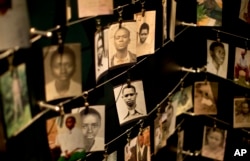More than two decades after the Rwandan genocide, two former mayors appeared before a Paris court Tuesday for their alleged participation in the slaughter, in a trial that highlights France’s complicated relationship with the tiny African nation and its alleged foot-dragging in bringing genocide suspects to justice.
Octavien Ngenzi and Tito Barahira, both now in their 60s, are accused of genocide and crimes against humanity — accusations that both deny.
Their scheduled two-month trial is only the second of its kind held in France since Rwanda’s 1994 slaughter, despite accusations facing several dozen other Rwandans on French territory.
“We’re happy the trial is taking place, but it risks being long and difficult,” said Alain Gauthier, president of the Collective of Civil Plaintiffs for Rwanda, a nonprofit that tracks alleged genocide perpetrators now living in France.
Given the many years gone by, Gauthier — whose wife lost relatives in the genocide — also warned that “time is on the killers’ side.”
Massacre of refugees
The trial casts a spotlight on the massacre of hundreds of Tutsi refugees who sought shelter in a church in the eastern town of Kabarondo, near the Tanzanian border. Ngenzi was mayor at the time, having taken over the post from Barahira.
Witnesses accuse him of inciting the local population to massacre refugees, saying they saw him wielding a spear during a rally, and calling for “work” — a code name at the time for killing.
Barahira is also accused of playing an active role. In interviews carried in France’s Liberation newspaper, villagers described the ex-mayor throwing an old lady to the ground before she was killed and ordering another woman to be killed by machetes.
A Rwandan court sentenced both to prison in absentia in 2009.
A year later, Ngenzi was arrested in the French overseas department of Mayotte, while Gauthier tracked down Barahira in the southern French city of Toulouse, where he was arrested in 2013.
Defendants agree to talk
Appearing before the court Tuesday morning, both said they would not exercise their right to silence and would respond to questions.
In remarks to French media, lawyers have highlighted “contradictions” in witness testimony, and one, Philippe Meilhac also said he was concerned about Barahira’s fitness to stand trial since he needs dialysis for kidney failure. The court has made special dispensations for his health problems.
Clemence Bectarte, a lawyer for the International Federation of Human Rights (FIDH), one of the civil parties in the case, called the trial a positive if tardy signal.
“It means that even 22 years after the genocide, justice can still happen,” she said. “It is important especially in France, because we know a lot of Rwandan genocide suspects have sought refuge here.”
But she and others have expressed concern that the head of the specialized unit investigating crimes against humanity, Aurelia Devos, abruptly pulled out of the proceedings, citing a “conscience clause.”
“It would be have been helpful for the prosecutor of this specialized unit to explain the factual and legal complexity of the crimes,” Bectarte said. “We hope it won’t have any consequences.”
The cases of several dozen other genocide suspects are also under investigation, including Agathe Habyarimana, the widow of the Rwandan president whose death in a plane crash sparked the genocide.
Yet so far only one suspect has been convicted. In 2014, a French court sentenced Rwanda’s former spy chief, Pascal Simbikangwa, to 25 years in prison. Simbikangwa has challenged the verdict, with an appeals trial set to open this October.
Last year, French judges threw out charges against Rwandan priest Wenceslas Munyeshyaka, 20 years after the first charges were filed against him. In 2004, the European Court of Human Rights also condemned France for the slowness in judicial proceedings.
Massive slaughter
Hutu extremists killed an estimated 800,000 Tutsis and Hutu moderates during the three-month spree that began in April 1994.
Diplomatic ties between France and Rwanda have long been strained over the genocide. Kigali has accused France — which supported former President Juvenal Habyarimana’s regime — of being complicit in the slaughter and even of participating in it.
French authorities deny those charges, and a French judge, in turn, has implicated Rwandan President Paul Kagame in the downing of Habyarimana's plane.
FIDH and other rights groups are also pressing for movement in a judicial inquiry launched in 2005 into the possible complicity of French soldiers in the genocide.
FIDH lawyer Bectarte described a broader gap between official rhetoric and reality.
“It is, in some respects, a lack of political will,” she said. “It’s sometimes difficult for France, but also for many other countries, to assume the diplomatic consequences of putting these cases forward. “
A number of other countries have brought Rwandan genocide suspects to trial, notably former colonial power Belgium, which has held a number of high-profile trials, including one in 2001 in which two nuns were sentenced to prison for their role in the slaughter.






